Search engine optimization (SEO) is digital marketing technique that is constantly changing. The year alone saw several Google algorithm updates:
SEO is important for digital marketers, website owners and brands of all sizes because, in a nutshell, it allows your site to appear in the search results when someone types or speaks a query for which you have an answer or solution. In other words, it increases a website’s visibility in the SERPs which leads to more organic traffic to your website.
Whether you’re a business owner who needs an overview of the new changes in SEO or an expert marketer who wants a refresher to your SEO strategy, this post will keep you updated on what to keep an eye on in 2020.
9 SEO Trends You Can’t Ignore in 2020
How is SEO going to change in 2020? Well, for starters, the share of organic search results will continue to gradually decline as more ads rule the SERPs.
Let’s discuss the biggest SEO trends we’re going to see in 2020:
Trend #1: The SERPs Will Get More Consolidated
The search engine results pages (SERPs) are not the same as they used to be even a few years ago.
The percentage of ad share has increased, the answer boxes and featured snippets have started getting a lion’s share of the clicks, and the “People Also Ask” feature that was launched in 2018 (which combines a few answer boxes together pushing the organic search result down) has grown in importance:
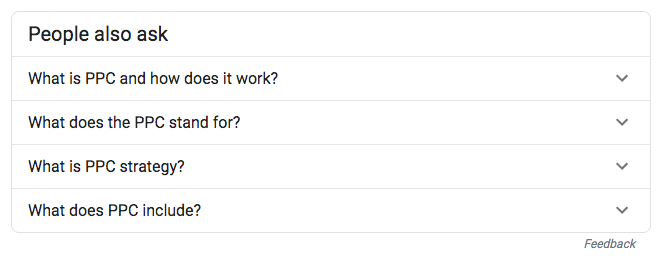
A new carousel for videos has also been added above the text-based organic search results and below the People Also Ask box:
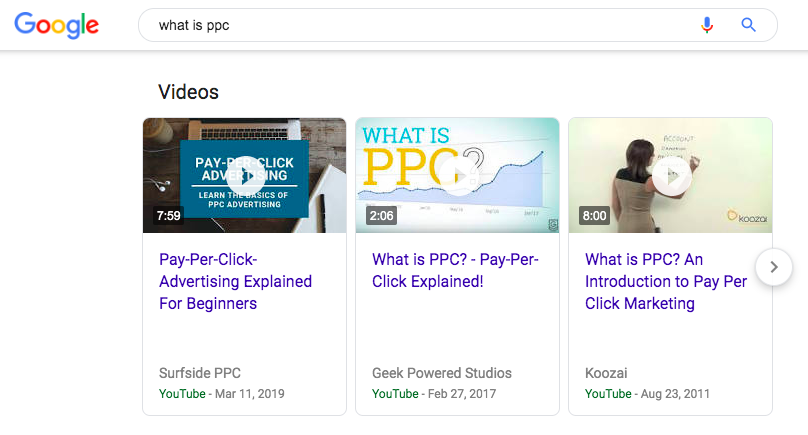
All such features have decreased the share of organic clicks to about 10% – down from around the 50% that it used to be:
The number of zero-click searches (also known as “rank zero snippet” and “position zero”) are going up, meaning that you will get an answer right there on the search results page rather than having to click on a link and visit a web page. This consolidation of the SERPs will make SEO tougher than ever before.
In order to maintain the flow of traffic to your website, you’ll need to think outside the answer box and diversify, which includes implementing omnichannel marketing as well as long-tail keywords.
You can use a tool like ClickFlow, which allows you to test the effectiveness of each page (or groups of pages) to increase your organic traffic without the hassle of building links or writing more content:
Dive Deeper:
Trend #2: Keyword Research Will Be Even More Important
Google has evolved from being a search engine to an answer engine. Although the manner in which keywords were used in web pages to improve relevance has changed, the foundation of your SEO strategy still rests on keyword research.
No matter whether searches are made by entering text or using voice, keywords are a primary factor for ranking algorithms. Click To Tweet
Here are some tips you’ll need to use in 2020 to upgrade your keyword research strategy:
- Use a combination of tools to prepare your master keyword list, such as Google Keyword Planner, SEMrush, Ahrefs, Answer The Public and UberSuggest.
- Think “topics” instead of direct “keywords,” as this will help you map out your secondary keywords from a primary keyword seed. As Brian Dean explains in this article, identify a set of topics and then enter them one by one into Google (to see Google’s autosuggest) and into YouTube (to see YouTube’s autosuggest):
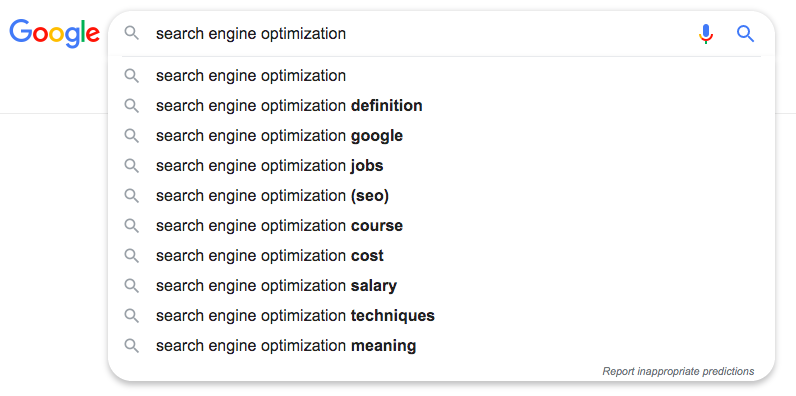
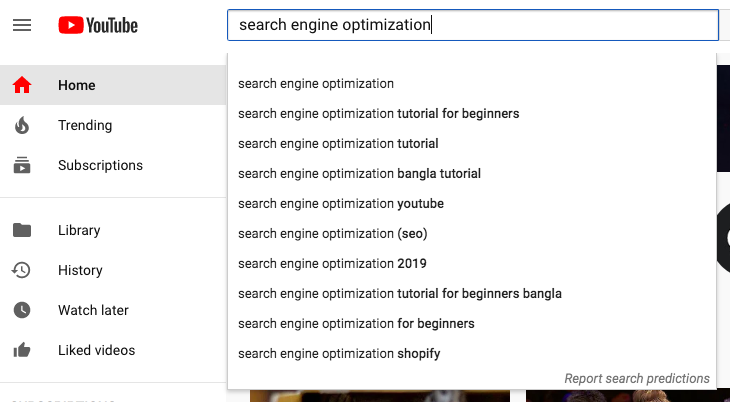
- Find keywords that result in more clicks than searches as discussed in this article by Nick Eubanks. This will help you identify keywords where the searchers click on more than one result:

Dive Deeper: Why You Should Use Long-Tail Keywords in Your SEO Campaign
Trend #3: Influencers Will Improve Your Site’s Engagement Metrics
Engagement metrics quantify the effectiveness of your content. Although not stated directly by Google, the search engine giant measures the engagement metrics of your site to better evaluate the quality of your content and then rank it in the search results.
The engagement metrics that play an important role in rankings are:
- Bounce Rate: Refers to the percentage of visitors who visit your website and then leave without visiting any other pages on your site.
- Dwell Time: The time between when a person clicks on a search result and when they leave that page.
- Time on Page: The amount of time a visitor spends reading a single page on your website.
- Return Visits: The number of visitors who land on your site again after having visited it before.
- Click to Call: The number of click-to-call requests that are made to connect with your business.
- Comments: The number of comments that people leave about your business or your content.
- Social Shares: The number of social shares your content receives.
What is going to change is that influencers will play a key role in boosting the overall SEO strategy for your business.
In 2020, the content or brands that an influencer endorses will receive more social shares and higher engagement in terms of comments and time on page. Click To Tweet
Reaping the power of influencers will have a direct and positive effect on engagement metrics, which means that Google will see your business as trustworthy, thus resulting in higher rankings, traffic and conversions.
Dive Deeper:
Trend #4: Voice Search Optimization (VSEO) Will Dominate
Consider these voice search statistics:
- Voice-based shopping is expected to jump to $40 billion in 2022.
- By 2024, the global voice-based smart speaker market could be worth $30 billion.
- 60% of smartphone users have tried voice search at least once in the past 12 months.
- 55% of teenagers are using voice search daily basis.
- More than 20% of voice search queries are triggered by a combination of these 25 keywords:
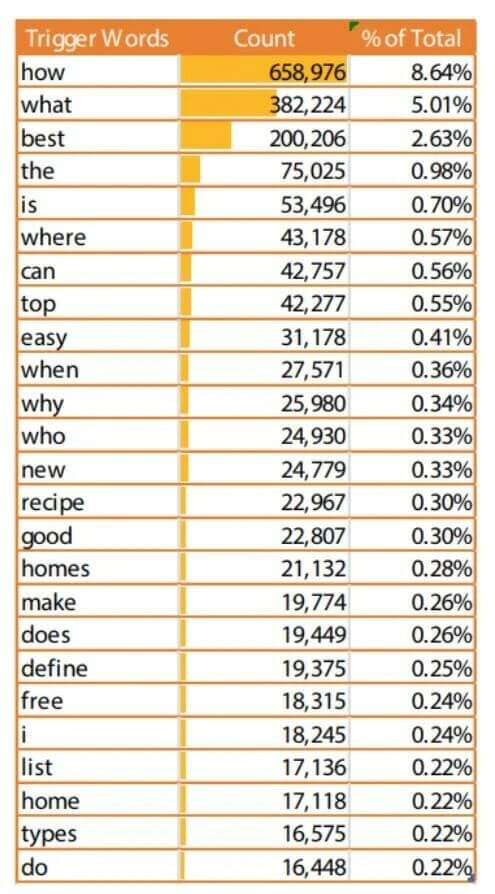
Because of voice-based technology, searches in the form of direct questions will play an even more crucial part of SEO in 2020:
“There is an important relation between semantic search and question keywords. Google can identify the entities present in the question keywords with the help of semantic search.”
The definition of “semantic” simply means “relating to meaning in language or logic,” and uses these criteria:
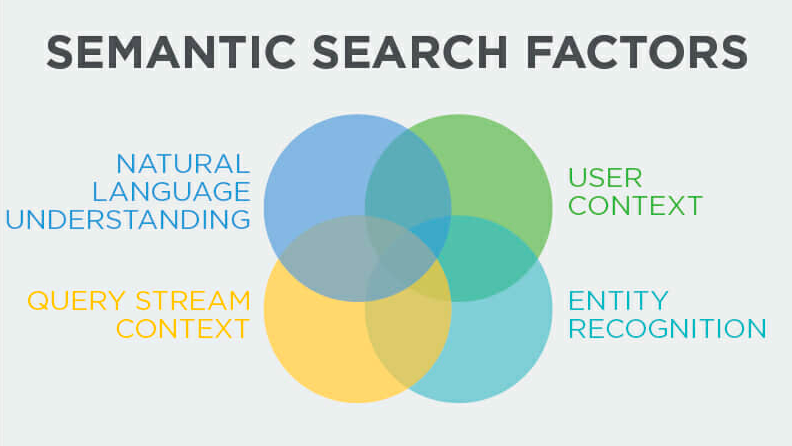
There are three types of questions answered by Google:
- Direct Answer Questions (DAQ): These question keywords start with What, Which, Where, Who, etc. Example: “What is the name of our galaxy?”
- Short Answer Questions (SAQ): These questions start with Why, Can, etc. Example: “Why is the ocean blue?”
- Long Answer Questions (LAQ): These questions require a longer, often instructional, answer. Example: “How do you cook pasta?”
Have a look at this video from Eric Su in which he explains how to optimize for voice search and use schema markup to dominate answer boxes in the SERPs:
Dive Deeper: VSEO: How Voice Search and Conversational AI Are Changing SEO
Trend #5: ‘Entity Popularity’ and ‘Entity Engagement’ Will Be Key to Local SEO
46% of searches on Google already have local intent, and the authority of local businesses will continue to be a key factor for higher rankings in 2020.
For example, if you are searching for pizza in New York, then Joe’s Pizza ranks higher because this local establishment is loved by the people in that city. In other words, if a lot of people love your neighborhood business, then Google will rank it higher on the local search results.
The authority of the business – or entity – is decided on the basis of “entity popularity” and “entity engagement.” A study published by Tidings states that engagement will be the most important factor for local SEO in 2020:
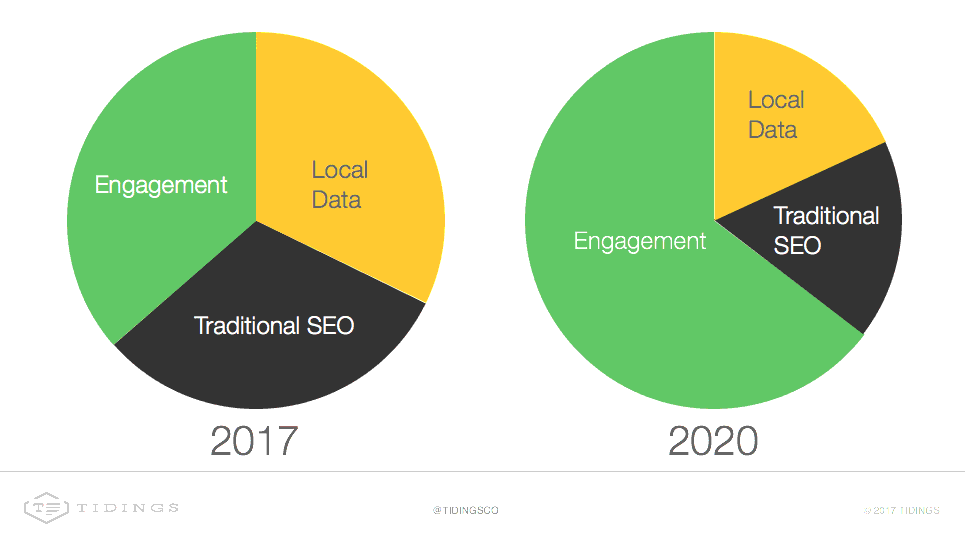
Entity popularity will be determined on the basis of the number of brand mentions that the business receives on social media, forums, articles, videos, etc.
Brand mentions or citations are different from a link. Under brand mentions, your business may or may not receive a link. Obviously a brand mention with a link is always better, but even if you are able to achieve a higher number of brand mentions without a link, it will still be beneficial for local SEO.
Entity engagement will be determined by “signals” on the web, such as:
- Do people love your business?
- How many positive reviews does your business have on Google My Business?
- Are there enough positive recommendations for your business on other review sites?
- How many people have saved your business as a contact on their Android phone?
- How many people ask for the location of your business using Google Maps?
All these are great signals that impact your local business’ popularity, so optimize your GMB listing and keep your NAP (Name, Address, Phone) accurate. Also try to generate as many local brand mentions as possible along with positive business recommendations about your company.
Dive Deeper:
Trend #6: Video Will Be Crucial for Your SEO Strategy
Video marketing will continue to be one of the key digital marketing trends for 2020.
A report from Zenith media predicts that the average online video consumption per person will continue to rise steadily next year and beyond. In 2018, people spent an average of 67 minutes watching online videos each day, and this figure is expected to reach 100 minutes per day by 2021:
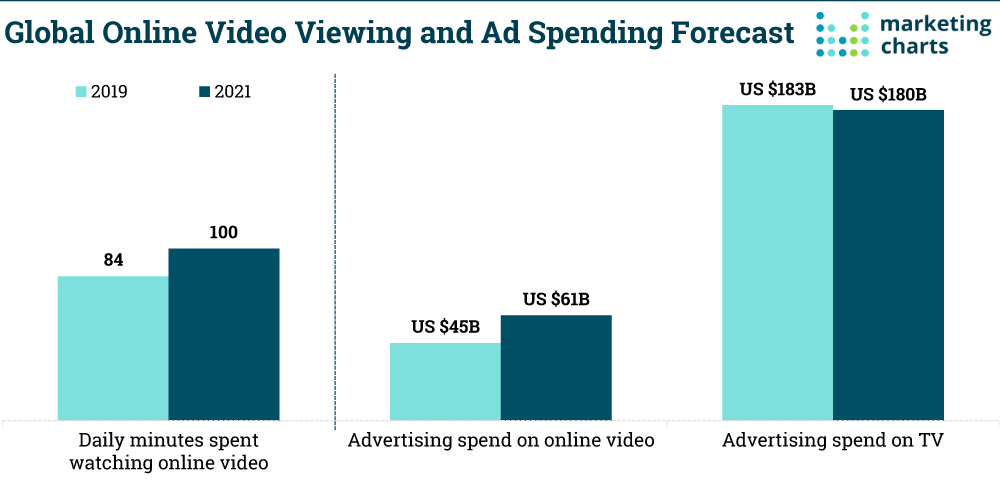
96% of people agreed that watching videos helped them learn more about a product or service. Hence, incorporating videos into your SEO strategy is a great way to improve brand engagement.
Here are some tips to boost your SEO with video:

- Add accurate schema tags to allow search engines to better understand your video content and rank it accordingly in the search results.
- Upload your video to multiple platforms.
- Add proper captions and include a transcript to every video you create.
- Optimize the title and description of your video and make sure your videos are mobile friendly.
Dive Deeper:
Trend #7: Content that Focuses on E.A.T. Will Be Rewarded by Google
With the launch of the recent BERT update, Google is getting better and better at understanding the relationship (or context) between words.
BERT stands for Bidirectional Encoder Representations from Transformers and is an update to the core search algorithm that comprehends the intent of the searcher behind a search query. This means that great content that focuses on the E.A.T. principle will rank higher:
- Expertise: the page needs to have quality content written by an expert writer
- Authority: the site itself needs to have some authority on the subject
- Trustworthiness: the site needs to have other authoritative links pointing to it from trusted sites
Out-of-context search results will be removed by Google, so try to create content that accurately answers the user’s query. Here are some effective ways to prepare great content:
- Details. Your content should be original and provide detailed information, even if it is brief. It should include all the steps necessary to complete a do-it-yourself task, for example. A partial or “fluff” list will earn a lower ranking.
- Value. An article must contain information of value, whether that is news, a new development or comprehensive explanations or instructions. Every page on your site should serve a clear purpose and must help the reader.
- Well written. Content should be engaging and well articulated, and the author should have an excellent grasp of the both the topic and the language.
- Well edited. All content on your site should be free of typos, misspellings, misused words and punctuation errors. All these things hurt the authority of the content as well as the website and should be avoided, even if that means hiring an editor and/or proofreader for your content creation department.
- Good user experience. The key to excellent content is providing a good user experience. The site visitor should not be assaulted with ads or pop ups, and articles should not be excessively spread over a number of pages, forcing your reader to constantly click on “next.”
- Schema markup. Add proper schema markup to your content to make it easier for the search engines to understand your content.
The E.A.T. principle measures the trust/authority score of the website where the content is published as well as the expertise of the author who wrote or published it. Both the website and the creator of the content should have a positive reputation.
For more help, check out Google’s Search Quality Rater’s Guidelines.
Dive Deeper:
Trend #8: Data Will Be the Future of SEO
An analysis of qualitative and quantitative data is crucial for your SEO strategy. Tracking user behavior and using the right tools for keyword research and site optimization are necessary to move your current SEO strategy in the right direction.
To do this, you need to select your data sources carefully and visualize your info by using data science. This will help you identify common issues, like why your customers are buying a particular product or behaving in a particular way after landing on your website.
Data science helps you make concrete decisions by letting you:
- Visualize which combinations have the potential to make the biggest impact
- Create marketing campaigns aligned with the needs of their audience
- Understand buyer’s preferences and identify pain points
- Identify referral sources of converting traffic
- Verify loading time, indexing, bounce rate, response errors, and redirects
- Verify the most and least crawled URLs
- Identify pages that crawlers aren’t supposed to index
- Identify sources of unusual traffic
Check out this short video to learn more about why data is the future of SEO:
Dive Deeper:
Trend #9: Mobile Usability Will Be Critical for Higher Rankings
Desktop optimization is starting to go the way of the dinosaurs. Mobile used to be an afterthought, then it was on par with desktops, and now mobile is leading the way. Google is already ranking websites on the basis of their mobile version.
Starting July 1, 2019, mobile-first indexing was enabled for all websites:
“Mobile-first indexing means Google predominantly uses the mobile version of the content for indexing and ranking. Since the majority of users now access Google Search with a mobile device, Googlebot primarily crawls and indexes pages with the smartphone agent going forward.”
In 2020, your entire SEO strategy should be mobile driven. If your site serves dynamic content based on the user’s device or has different URLs for desktop and mobile, then you need to follow these best practices to make your site mobile friendly.

Dive Deeper: Mobile-First Indexing: Everything You Need to Prepare Your Site
What’s Next?
When it comes to SEO, 2020 will be the year of stiff competition as it will be difficult for site owners to earn a significant share of organic traffic from Google. But you can get an edge over the competition by staying up to date on the SEO trends in this article.
Start revising your SEO strategy now to include VSEO (voice search optimization), zero-click search, interactive video marketing, a more focused use of influencers, entity popularity for your local business, and “topics” instead of direct “keywords.”

